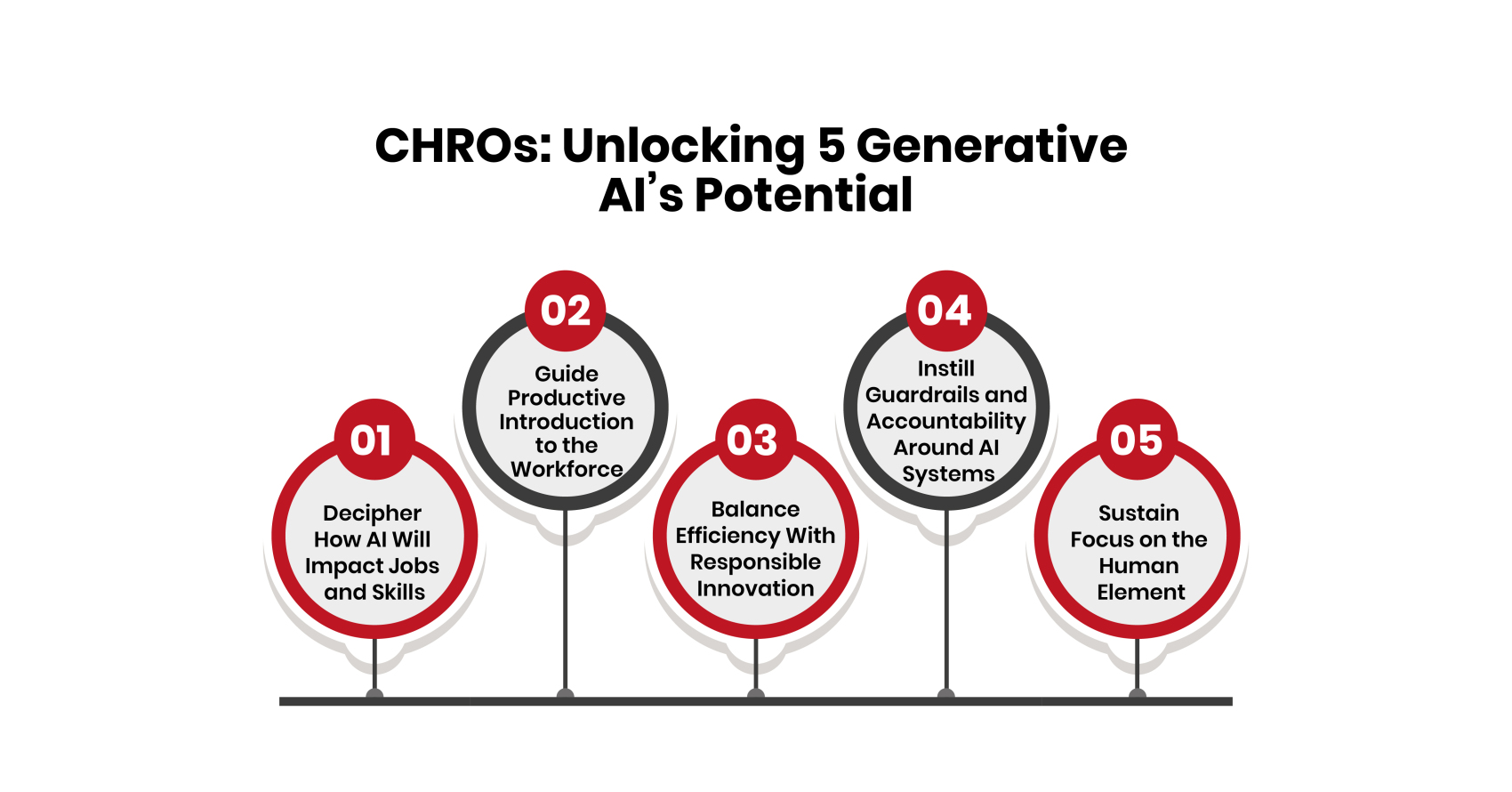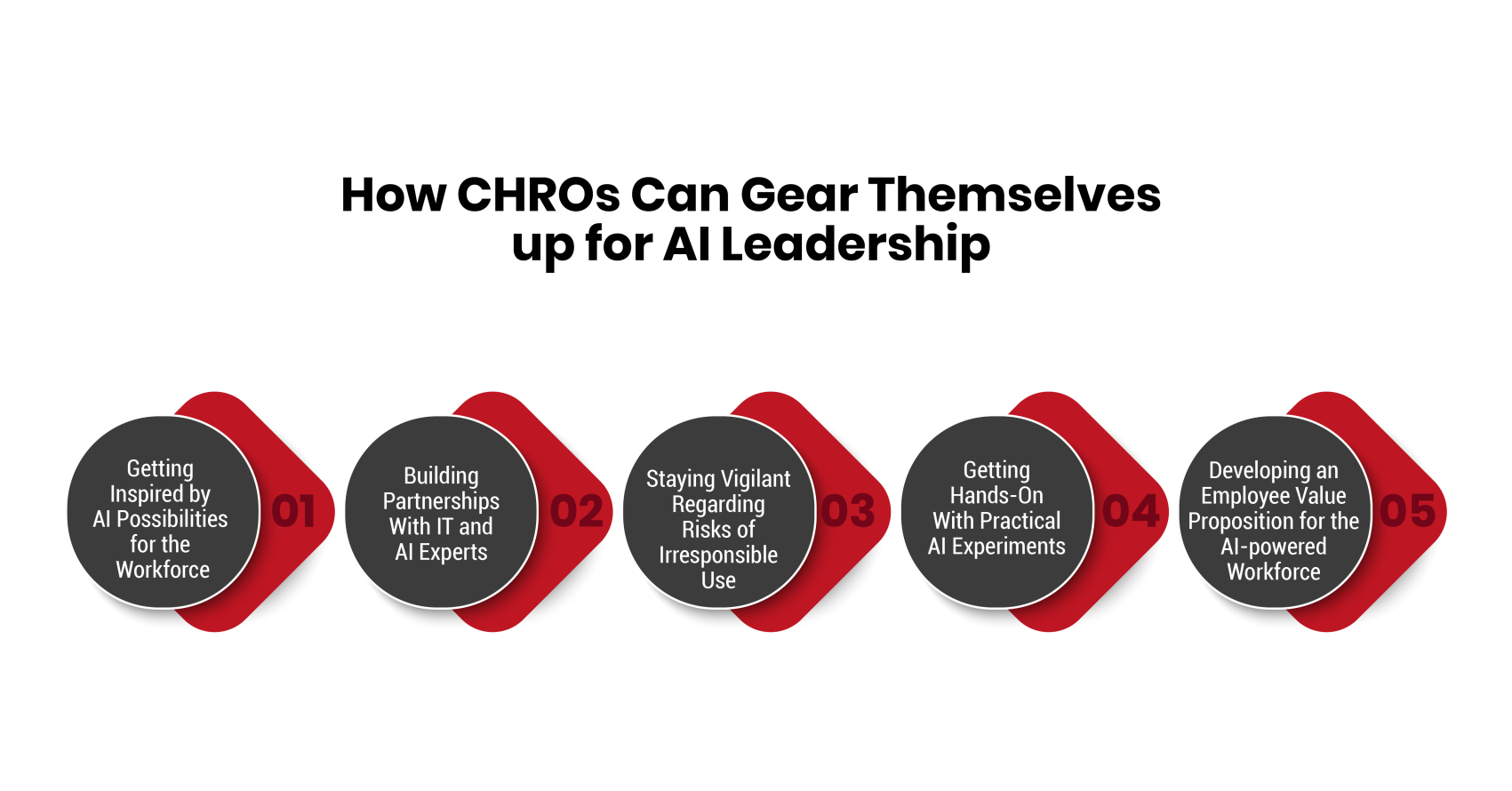The hype around generative AI is definitely warranted. This advanced form of artificial intelligence promises to bring new efficiencies to organizations by automating repetitive tasks and providing humans with insightful recommendations.
Early research shows that all centers leveraging AI see a 14% boost in production. For an industry plagued by high attrition, generative AI also lowered employee turnover rates.
However, fully tapping the potential of AI requires more than handing the technology over to IT teams. Generative AI promises to fundamentally transform how work gets done. This makes AI adoption a complex organizational change process with many people impacts.
CHROs must recognize that they need to spearhead their organization's generative AI strategy. As the leaders responsible for managing talent, employee performance, and organizational culture, CHROs are best positioned to navigate AI's influence on the workforce.
In this article, we'll explore why CHROs should drive their company's approach to generative AI and how they can prepare for this increasing responsibility.
At its core, successfully leveraging generative AI is about augmenting human capabilities, not wholesale replacement. The technology analyzes patterns in data to provide recommendations that enhance employee productivity and decision-making.
For example, AI assistants can provide customer service agents with relevant information and appropriate responses to deliver better service. Generative AI also has applications in other business functions like marketing, product development, and supply chain management.
However, this human-AI collaboration requires changes to work processes, job roles, skills requirements, and more. Organizations can only realize AI's benefits by carefully managing the people dimension of this transformation.
Some of the key people impacts CHROs need to navigate include:
An NBER study found a 14% increase in call center productivity from generative AI. However, these productivity improvements manifest differently for newer versus more tenured employees.
While newer hires got up to speed 35% faster with AI assistance, established top performers saw no measurable benefit. In fact, some felt AI prompts were distracting.
This differential impact raises some challenges regarding performance management and rewards:
As AI handles repetitive tasks, jobs will likely become less transactional and more creative. Training will play a key role in helping employees transition to working symbiotically with generative AI:
Organizations already struggling with skills gaps must invest adequately in capability building around generative AI.
Widespread AI adoption can positively or negatively influence organization culture, morale, and retention. Employees want reassurance that AI makes work better, not redundant. They also desire transparency around AI's ethical use.
Without thoughtful change management guided by leaders who understand employee sentiments, lack of trust in or hostility towards new technologies could develop.
CHROs know that culture and employee experience drive performance. So, they must continually assess and steer AI's cultural assimilation.
Like any business-critical asset, generative AI requires governance policies that promote ethical implementation and prevent misuse. For instance, using biases hidden in data to train AI can perpetuate discrimination.
As AI permeates business decisions, establishing oversight mechanisms, risk management processes, and accountability will grow in importance. CHROs spearheading cultural values and people risk are natural custodians of responsible AI governance.
An AI strategy solely chasing efficiency metrics risks overlooking potential downsides regarding job impacts, transparency, or workforce dynamics.
Responsible innovation requires assessing both near-term quick wins and long-term cultural transformation. Then developing a roadmap aligning change initiatives with the vision to uplift employees and customers alike through AI.
With their end-to-end view of the employee lifecycle, CHROs can strike this crucial balance between AI benefits and judicious innovation.
Given the multifaceted impact of people impacts, achieving AI success goes beyond an IT implementation to necessitate organizational transformation. This evolution calls for evocative leadership around strategy, culture, ethics, and change management.
CHROs' expansive people management responsibilities situate them perfectly to spearhead this transformation.
Here are five reasons CHROs must drive their company's generative AI game plan: 
As AI handles repetitive tasks, jobs will likely blend interpersonal skills like creativity with technical prowess in leveraging AI. CHROs possessing insights into emerging capabilities can redesign job frameworks outlining new multidimensional expectations.
They can identify reskilling needs, like working alongside AI tools, and ramp up HR's capability building machinery. Handled strategically, AI could fill persistent skills gaps hampering business growth.
Much like automation and digitalization previously, naive AI implementations risk workforce resistance or underutilization of expensive new technologies.
CHROs can carefully champion cultural readiness and employee adoption. This necessitates co-creating transparent policies guiding acceptable AI use and preventing unfair consequences like job cuts.
AI in HR can ready managers to lead teams through AI shifts and offer training to build workforce receptivity.
Single-mindedly chasing productivity metrics through AI risks unintended downsides like deskilling employees or opacity around AI's workings.
CHROs' holistic view of the employee lifecycle positions them to judiciously assess AI tools against ethical criteria before deployment. They can balance efficiency goals with responsible innovation uplifting both employees and customers.
Like any business asset, AI requires thoughtful oversight policies regarding potential risks - inaccurate recommendations, discriminatory outcomes, misuse, or over-reliance.
As custodians of workforce risk management, CHROs recognize AI's promise and perils. They can institute governance practices ensuring ethical usage - accuracy checkpoints, human monitoring, and correction protocols.
Amidst the allure of technology, CHROs anchor business priorities to the human element - employee success powering consumer joy. Their vision of responsible innovation using AI to unlock human potential keeps organizational transformation empathetically grounded.
To spearhead AI success, CHROs must develop themselves on multiple fronts: 
HR leaders should actively research and experience AI use cases uplifting various business functions through improved productivity and decision augmentation.
While call centers demonstrate direct efficiency gains, AI also unlocks new realms of creative possibility for teams in marketing, product development, customer service, and recruitment. Tracking inspirational case studies can spark ideas for responsible AI innovation across the organization.
For instance, food and beverage leader Nestle automated various talent acquisition screening tasks using AI leading to 50% faster candidate identification and more diversity among potential hires.
Technology and analytics leaders possess valuable perspectives on how emerging tools like generative AI can transform business processes. HR heads invested in forging strong working relationships with these teams will benefit from real-time insights on innovations relevant for the workforce.
Joint brainstorming exercises exploring AI opportunities balanced with people priorities will lead to prudent innovations. CIO-CHRO partnership is pivotal to tightly align AI rollouts with necessary reskilling programs and change management interventions.
Unfortunately, instances of unethical applications of AI causing harm already dot the corporate landscape. CHROs should track emerging risks like built-in algorithmic biases, opaque decision processes, and lack of accountability around AI.
Learning from other companies' missteps creates organizational antibodies preventing such occurrences internally through proactive governance frameworks. Responsible innovation must balance potential efficiency promises against ethical quandaries.
Beyond cursory knowledge building, CHROs should deliberately create internal opportunities to pilot AI capabilities in a limited, low-risk capacity. These experiments provide firsthand learning into AI functioning, workforce sentiment toward new tools, and change management necessities.
Ideally, such projects assessed against a balanced scorecard spanning efficiency, quality, risk, and employee experience metrics will illuminate decision trade-offs. These lessons then inform wider AI strategy.
The increased use of AI and automation evokes fears of human redundancy in some quarters. However, research shows about half of workers are enthusiastic about AI augmenting rather than replacing them. The other half expresses tentative optimism or distrust regarding AI's impact on work and jobs.
CHROs play a pivotal role in developing and articulating a compelling employee value proposition centering how AI elevates staff and helps the organization deliver greater customer value. This narrative must be backed by transparent AI policies, training investments, role redesigns, and cultural assimilation initiatives putting people first.
The rise of generative AI is a watershed moment for business with McKinsey estimating 70% of companies likely adopting some form of AI by the end of 2030. Early movers stand to gain tremendous advantages.
However, the organizations realizing AI's full potential will be those recognizing people's implications early. The pivot from efficiency metrics toward responsible innovation uplifting customers and employees alike requires evocative leadership and cultural nurturing.
Who better to provide this kind of leadership than the very leaders entrusted with advancing an organization's purpose through talent - the CHROs.
CHROs find themselves at the cusp of history with generative AI promising to either augment or replace much of human effort. By harnessing AI judiciously, the future of CHRO can usher in a new era of productive and fulfilling work. However, this requires enlightened stewardship of AI putting people first.
The opportunity awaits for CHROs to step up and steer their organization's AI revolution!
This website uses cookies to enhance website functionalities and improve your online experience. By browsing this website, you agree to the use of cookies as outlined in our privacy policy .
Get unlimited free access to TopCHRO.com